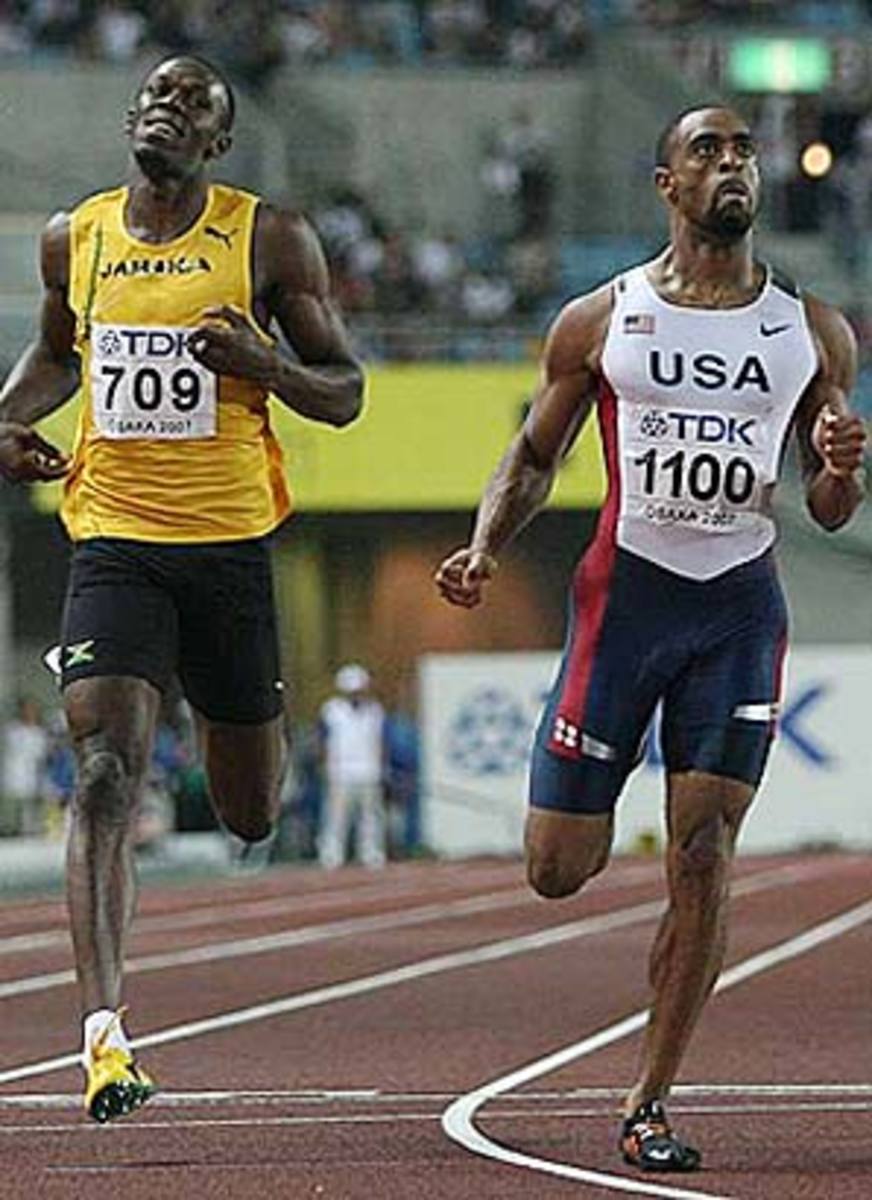Five storylines to watch
The IAAF World Championships in track and field kick off on Saturday morning in Berlin and run through Sunday Aug. 23. Here are five things to look for at the upcoming championships:
1. Usain Bolt vs. Tyson Gay
Consider this a showdown between The Man (Usain Bolt) and the Man Who Could Have Been (Tyson Gay). Given the historic performances by Jamaica's Bolt at the Beijing Olympics last season, with world records of both 9.69 seconds for 100 meters and 19.30 for 200 meters, it is easy to forget that Gay, in 2007, was the dominant sprinter on the planet, winning world titles in Osaka at 100 and 200. Last year, Gay's season blew up with a miserable hamstring injury and Bolt stole the spotlight, the gold medals and the endorsement dollars.
Gay showed he was back in full form when he ran 19.58 for 200 in New York in May. Last month he ran 9.77 for the 100 in Rome. Both marks stand as the world's best this year. Earlier this week, he compared his position this year to the one he faced before the world championships in Osaka in 2007: That year, Jamaica's Asafa Powell came in as the favorite, but Gay sprinted to his double victories. Gay had more hamstring woes recently, but his victory in the 200 at Crystal Palace last month in 20.00, under poor conditions, showed that he can still challenge for the top spot.
2. Who will overcome the hurdles?
Consider the last three major international track and field competitions. At the 2008 Olympics in Beijing, Angelo Taylor overcame his so-so third-place finish at the Olympic trials to capture his second Olympic title in the 400-meter hurdles.
So what if Taylor placed third at nationals again this year? Taylor is a pressure guy who loves the spotlight of a major race. Go back to the 2007 Worlds in Osaka, when Kerron Clement won his one big race of the season. Also think back to the 2005 Worlds in rainy, cold Helsinki, where Bershawn Jackson snatched the gold medal. Now take all three U.S. hurdlers, put them into the same field for 2009 and pick your straws out of a hat.
Jackson has gone back under 48 seconds this year after a three-year hiatus, and if Berlin gives the runners a downpour, as it sometimes does, the poor conditions could suit Jackson. But this will not be a gimme for the Yanks. Jamaicans Danny McFarlane and Isa Phillips will challenge for the podium, and South Africa's LJ van Zyl enters the meet with a world-leading 47.94 for the season. Can any of them stand in the way of a U.S. sweep?
3. Do fast things happen in threes?
Speedsters Alyson Felix and Michelle Perry are both eyeing three-peats at the World Championships. Felix is trying to become the first woman to win three straight world titles at 200 meters, a race in which she settled for silver at the Beijing Games last summer. She ran a solid, world-leading 21.88 in Stockholm two weeks ago and seems primed for a run at number three.
Debbie Ferguson-McKenzie of the Bahamas finished second to Felix in Stockholm at 22.23 and may be her biggest challenger. At 33, Ferguson-McKenzie has seemingly gotten a second wind this season, just as Jamaica's Veronica Campbell-Brown has struggled with injury.
Perry is trying to become the first to three-peat in the women's 100-meter hurdles. Unlike Felix, she won't enter the race as the favorite. Dawn Harper outraced Perry, her training partner, at the U.S. championships in Eugene earlier this summer, crossing the line in a wind-aided 12.36 seconds. Harper also ran 12.53 in the semis in Eugene. Also watch for Canada's PriscillaLopes-Schliep, the Olympic bronze medalist, and Australia's Sally McLellan in the race.
4. Is there a story to relay?
How many times has a U.S. quartet run out of the zone or dropped the baton at least once at a major meet? This time around, the U.S. teams will enter as clear favorites in the men's 4x400-meter relay and perhaps slight underdogs to the Russians in the women's four by four.
But the four-by-ones figure to be superb battles between the U.S. and Jamaican teams. Three of the four sprinters who led Jamaica to a world record 37.10 in Beijing are back this season, with Steve Mullings replacing Nesta Carter and joining Bolt, Powell and Michael Frater.
The U.S. team has a number of candidates to choose from to join Gay, including Mike Rodgers, the surprise national champ in Eugene, Ore., this year, and veterans Shawn Crawford, Darvis Patton and Travis Padgett. After some poor exchanges knocked them out of the Beijing final, the U.S. quartet is eager to regain its spot in sprinting preeminence.
5. Will there be any Ethiopian distance doubles?
Take your pick among four distance athletes running both the 5,000 and 10,000 meters in Berlin. Though he has called the distance an impractical strain, Kenenisa Bekele is the reigning Olympic champion at both the five and the ten. At 27, he has won nearly everything, but never the 5,000 at worlds. The one man who is most likely to stand in his way? Eliud Kipchoge, the Olympic silver medalist in the 5,000.
Three women are set to double, too: Tirunesh Dibaba, Meseret Defar and Meselech Melkamu. None of this is set in tartan. Ethiopian coaches are sure to monitor their runners' fitness levels and go to another roster if necessary. Those subs are usually fast enough to challenge for medals and pace the stars to the front anyway.






